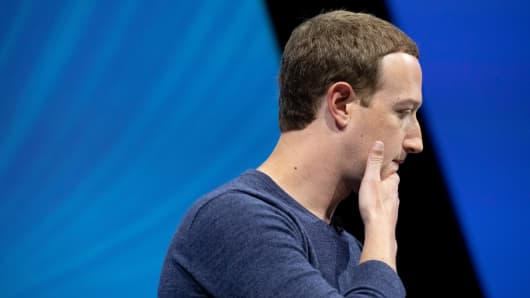Facebook CEO Mark Zuckerberg backed stronger government regulation of the Internet on Saturday, but it may be too little too late for a company that remains mired in controversy and subject to investigations around the world.
It’s been over a year since the public learned that a U.K.-based political consulting firm called Cambridge Analytica exploited Facebook‘s business model to influence the U.S. presidential election in 2016. Since then, the company has faced growing scrutiny from its users and even employees as more privacy scandals unraveled throughout 2018.
Though Facebook’s top executives were hauled in to face critical congressional leaders, its users and investors don’t seem to care. The company, which has a market value over $475 billion, posted a strong Q4 2018 earnings report in January. Facebook also met analysts’ expectations for daily and monthly active users, which clocked in at 1.52 billion and 2.32 billion, respectively. Despite all the scandals, its stock price is up more than 4 percent over the past year, trading at $166.69 as of Friday’s close.
If users don’t care, regulators might. Facebook still faces a number of investigations and charges from various agencies in the U.S. and abroad, which combined, have the potential to levy significant fines.
There are several agencies thought to be still investigating or charging Facebook over its data practices, although several agencies declined to confirm the status of their investigations. A Facebook spokesperson did not provide comment for this article and declined to confirm which government entities are still probing its business. The company has previously said it is cooperating with government agencies at home and abroad.
Here are some of the government arms that are thought to be scrutinizing Facebook as of late March:
Justice Department and Eastern District of New York
Prosecutors from the U.S. attorney’s office for the Eastern District of New York have been conducting a criminal investigation of Facebook, The New York Times reported earlier this month. A grand jury in New York subpoenaed records from at least two well-known companies that make smartphones and other devices, according to the Times. The companies reportedly had both partnered with Facebook to access personal information from hundreds of millions of Facebook users.
The Times reported in June that Facebook gave broad access to its users’ data to at least 60 companies with which it had data-sharing agreements.
A spokesperson for the Eastern District of New York’s U.S. attorney’s office could not confirm or deny any investigation. The U.S. Justice Department did not immediately respond to CNBC’s request for comment.
Department of Housing and Urban Development
HUD filed a civil complaint against Facebook on Thursday, charging the company with “discrimination” in its advertising practices for housing. The agency is seeking damages for anyone harmed by Facebook’s targeted advertising policies. The company has since changed its advertising system to no longer allow employers and landlords to limit their targeted audience by race, ethnicity or gender. It settled a lawsuit with the ACLU last week over the practice.
A senior HUD official told CNBC it expects that millions of users may have been affected by the allegedly discriminatory policies based on the scale of Facebook’s platform.
A Facebook spokesperson told CNBC Thursday that it was surprised by HUD’s decision to file the complaint but said it will “continue working with civil rights experts on these issues.”
Irish Data Protection Commission
The European Union’s data protection watchdog group has launched multiple investigations into Facebook’s privacy practices. Ireland’s Data Protection Commission released its annual report in February disclosing 15 ongoing investigations of major tech firms as of the end of 2018. Of those investigations, 10 were focused on the data usage by Facebook and two products it owns, Instagram and WhatsApp.
The investigations largely centered around whether Facebook or its subsidiaries violated the European Union’s General Data Protection Regulation, which came into force last May and is generally stricter than U.S. data privacy law.
In a statement, the Irish DPC confirmed it “currently has 10 statutory investigations open in relation to Facebook and its subsidiaries (Whatsapp and Instagram), a number of which are at an advanced stage in terms of a draft inquiry report being finalised for submission to the parties for their submissions on the inquiry findings. These investigations were commenced both in response to complaints the Irish DPC is competent to handle as the lead supervisory authority of the companies concerned, and at the DPC’s own volition having identified matters which warranted further investigation.”
Belgian Data Protection Authority
Facebook was scheduled to appear in front of an appeals court in Brussels for a two-day hearing this week to challenge a 2018 court order, which said it must stop tracking users and non-users without consent, according to the BBC.
In a press release published Tuesday prior to the hearing, the DPA said that it stands by the court’s initial ruling and believes “that Facebook should be ordered to respect Belgian and European privacy rules when it processes personal data through its cookies, social plug-ins and pixels.” If Facebook fails to comply with the court order, it could face a daily fine of 250,000 euros, which would be the equivalent of more than $280,000, according to Bloomberg.
German Federal Cartel Office
Facebook has appealed a February ruling from Germany’s Federal Cartel Office that called into question Facebook’s business model and said it “overstepped” the boundaries of GDPR, especially in light of what it called “Facebook’s dominant position” in the market.
“There is no effective consent to the users’ information being collected if their consent is a prerequisite for using the Facebook.com service in the first place,” the case summary stated.
The FCO gave Facebook 12 months to change its data and cookie policies to comply with the ruling. A spokesperson from the FCO did not immediately respond to CNBC’s request for comment.










